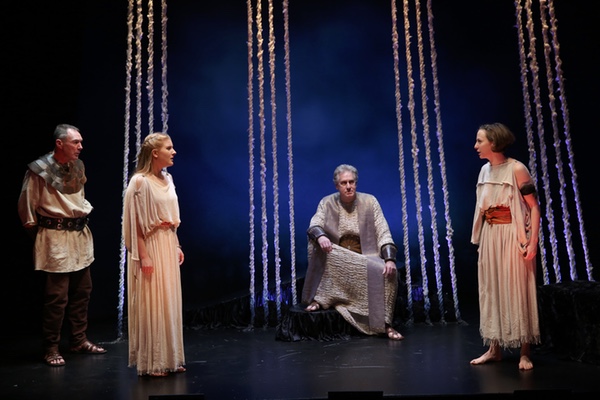Thebes 466 BC vs. Baghdad, 2003 and a New Look at Sophocles and War

In a note in the program for the play The Burial at Thebes that just opened at the Irish Repertory Theater in New York director Charlotte Moore claims that the plot of Sophocles 2,400 year old story is similar to the story of the Bush Administration’s war against Saddam Hussein in Iraq in 2003.
It is not.
Moore charges that King Creon’s insistence that his people had to be all for or all against him in his post-war dispute with dissidents was the same as President George W. Bush’s demand that the American people back him completely in a war against Iraq that was supposed to have been caused by U.S. intelligence insistence that Saddam Hussein had nuclear weapons that he was prepared to use.
Moore might as well have claimed that since Greece was on the water the story was similar to George Washington’s crossing of the Delaware River in the American Revolution in 1776.
Having said that, I must also say that Seamus Heaney’s play itself, based on Sophocles’ Antigone, is a solid and absorbing drama, a nice look at Greek history and a scalding indictment of the power madness of leadership everywhere and in all centuries.
The story is a simple one. The Thebans have won a war and in it two brothers were killed. One was a Theban hero and the other an exile who fought with the opposition army in an effort to defeat Thebes and kill his former countrymen. Thebes’ King, Creon, ordered a hero’s funeral for the hero and ruled that not only would there be no funeral for the other, but that anyone who tried to bury him would be executed. Antigone, the loving sister of both men, steps forward and tries to bury her exiled brother’s body. The King, thunderstruck by the post-war power he now has and thrilled by his popularity, ordered dissident Antigone to be buried alive in a nearby cave. Everybody in Thebes, and I mean everybody, is appalled by his ruling. They all think he is wrong and tell him so, repeatedly. It is macho male, dictatorial madness to kill a woman who just wanted to bury her brother, the citizens of Thebes tell the King.
Mighty Creon, his alpha juices flowing, will not back down. The dispute then grows as both his wife and son, Antigone’s lover, disagree with him, too. After all, Sophocles and then Heaney suggest, why execute someone for loving their brother? Isn’t family just as important as patriotism?
Arguments ensue, threats are made and the play then hurtles towards an explosive conclusion.
There is much real history and theater history, too, in the play. Thebes was a large city in central Greece surrounded by a famous seven gated wall that protected the people from invaders. It was the setting for many of Greece’s myths and historical legends. The city’s army featured an elite guard, the Sacred Band of Thebes. The city gained great power when it defeated Sparta in 371 BC, but lost it when forces under Alexander the Great crushed its military in 335 BC. The city appears often in Greek histories.
Sophocles was one of Greece’s three great tragedy playwrights, along with Euripides and Aeschylus. The writer, who lived to be 90, is said to have written 123 plays, few of which survive. His premier work, often produced was Oedipus the King. Antigone was the second favorite. Greece held numerous playwriting contests in his era (he was born in 496 BC) and in them he handily defeated Aeschylus. He specialized in small cast, personal drama stories and was famous for creating deep, multi-layered characters, such as Antigone.
Director Moore has done a fine job of directing the play ay. She knows a lot more about theater staging than world history. She gets fine performances from Paul O’Brien as Creon, Claran Bowling as son Haemon, Rod Brogan as the delightful messenger, Winsome Brown as Queen Eurydice, Katie Fabel as Ismene, Robert Langdon Lloyd as Tiresias and, especially, the gifted Rebekah Brockman as an emotionally torn Antigone.
The only real weakness in the production, staged at the DR2 Theatre, the Irish Rep’s temporary home at 103 E. 15th Street, New York, is the nearly barren set, which could not have cost more than $3 to build? It is just a spartan space and a curtain with something supposed to resemble Greek columns on a blue backdrop. There is an Au Bon Pan restaurant one block away, on Union Square. It must have cost more for a sandwich there than to build the entire set.
The Burial at Thebes is a smartly staged and thoughtful take on Sophocles’ great drama. It is a reminder, too, that we should not shudder at an invitation to see a Greek play. Some of them, such as this one, were very good. You learn a lot of history in Greek plays, too
Wherever he is, Saddam Hussein must be shuddering. Now they’re blaming him for a 2,300 year old war, too.
PRODUCTION: Sets: Tony Walton, Costumes: Linda Fisher, Lighting: Brian Nason, Sound: Zach Williamson The play is directed by Charlotte Moore. It runs through March 6.